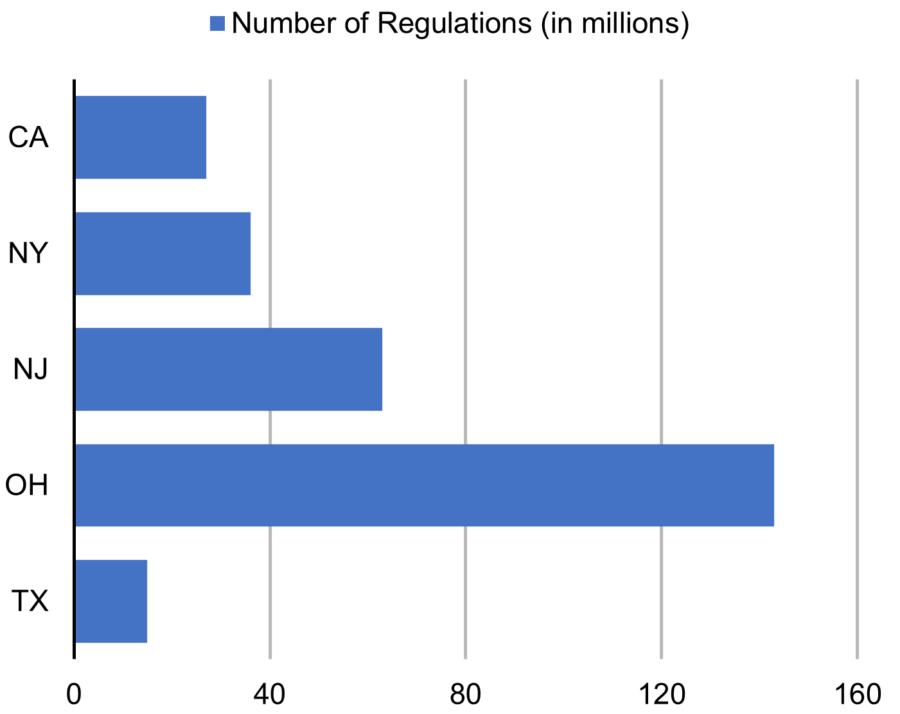The Issue
Regulations are often a necessary function of civilized society. Laws and regulations dealing with public health and safety and fraudulent practices are often accepted as necessary infringements of freedom and liberty. The question is how much regulation is necessary to effectively achieve the desired protections. Regulations can stifle innovation and economic growth and prevent or hinder individuals and businesses from entering or expanding their investment in the marketplace. Regulations can also create monopolies or oligopolies where only a few large market incumbents are able to flourish. This then leads to higher prices and less innovation for consumers.
Texas ranks as the fifth highest economically free state in the nation according to a 2019 study by the Fraser Institute. The study analyzes and compares the policies of individual states and other nations in their support for economic freedom and the ability of individuals to act within the economy free of undue restrictions.
And yet, despite Texas’s reputation for low taxes and reasonable regulations, the state has among the highest number of regulations in the nation. According to the Mercatus Center at George Mason University, the state of Texas ranks fifth highest among all states in the total number of regulations. Only California, New York, New Jersey, and Ohio rank higher. The number of regulations in this study is measured by the number of words in the total compiled number of regulations. By that count, Texas has 14.9 million words in the Texas Administrative Code, the repository of all published and effective rules. Many of these are unnecessary and should be repealed.

The recent COVID-19 pandemic and resulting economic shutdowns have forced many governments to review which regulations are absolutely essential and conversely which can be eliminated, at the very least during the shutdowns and the reopening of the economy. Texas Governor Greg Abbott, using his emergency declaration, waived a number of regulations identified as unnecessary and as hindering state responses to the pandemic.
Even before the pandemic, in October 2019, Governor Abbott directed state agencies to overhaul and trim licensing requirements and regulations and to reduce fees, educational requirements, and other licensing barriers for certain professions.
The questions now and going forward are, if the state can survive without certain waived regulations during an emergency, can many of them be eliminated completely, and can others be repealed or trimmed with no adverse impact on public health and safety? And can the repeal of these regulations lead to improvements in economic growth and productivity? The answer is yes on all counts. We can reduce the overall number of regulations and reduce the restrictive impact of others on the economy.
Texas already has a number of tools available to review and reduce regulations and their burden on the economy and the state’s citizens. These can be expanded to review all regulations that may be anticompetitive or unnecessary.
The Governor’s Office also has a Regulatory Compliance Division which conducts an independent review of certain state licensing agencies’ proposed rules that adversely affect market competition by creating a barrier to market participation in the state or resulting in higher prices or reduced competition.
The Regulatory Compliance Division was authorized by the 86th Legislature in response to the United States Supreme Court’s decision in North Carolina State Board of Dental Examiners v. Federal Trade Commission, which overturned certain regulations as being anticompetitive. The division is limited in scope to certain licensing agencies, but it could be expanded.
Texas has already done a good job trying to identify and reduce excessive regulations but can do more. By reviewing all regulations and repealing those that are unnecessary or that adversely impact competition or market participation, Texas can become even better for those participating in or entering the marketplace.
The Facts
- Despite a reputation for low taxes and reasonable regulations, Texas has the fifth highest number of regulations of all states.
- The state of Texas has recently undertaken initiatives to reduce certain licensing regulations that adversely impact competition and market participation.
- Governor Abbott has waived certain regulations during the COVID-19 pandemic that hinder state efforts to combat the pandemic but are also otherwise not necessary for the health and safety of the public.
Recommendations
- Expand the Governor’s Office’s Regulatory Compliance Division beyond certain licensing agencies to review all agencies’ rules for adverse effects on competition and barriers to market participation.
- Extend the governor’s emergency waivers and suspensions of regulations that are not necessary for the health and safety of the public.
- Expand on the list of rules and regulations waived or suspended by directing agencies to review and repeal unnecessary regulations and those adversely affecting competition and market participation.
- Repeal statutory direction for the adoption and enforcement of regulations not necessary for the health and safety of the public and that may adversely affect competition and market participation.
Resources
Economic Freedom of North America by Dean Stansel, Jose Torra, and Fred McMahon, Fraser Institute (Nov. 2019).
Quantifying Regulation in U.S. States by James Broughel, Patrick McLaughlin, and Michael Kotrous, Mercatus Center (Nov. 2019).